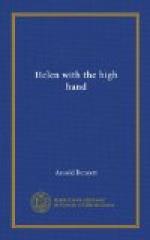CHAPTER XVI
THE HALL AND ITS RESULT
“Yes,” said Mrs. Prockter, gazing about her, to James Ollerenshaw, “it certainly is rather spacious.”
“Rather spacious!” James repeated in the secret hollows of his mind. It was not spacious; it was simply fantastic. They stood, those two—Mrs. Prockter in her usual flowered silk, and James in his usual hard, rent-collecting clothes—at the foot of the double staircase, which sprang with the light of elegance of wings from the floor of the entrance-hall of Wilbraham Hall. In front of them, over the great door, was a musicians’ gallery, and over that a huge window. On either side of the great door were narrow windows which looked over stretches of green country far away from the Five Towns. For Wilbraham Hall was on the supreme ridge of Hillport, and presented only its back yard, so to speak, to the Five Towns. And though the carpets were rolled up and tied with strings, and though there were dark rectangular spaces on the walls showing where pictures had been, the effect of the hall was quite a furnished effect. Polished oak and tasselled hangings, and monstrous vases and couches and chairs preserved in it the appearance of a home, if a home of giants.
Decidedly it was worthy of the mighty reputations of the extinct Wilbrahams. The Wilbrahams had gradually risen in North Staffordshire for two centuries. About the Sunday of the Battle of Waterloo they were at their apogee. Then for a century they had gradually fallen. And at last they had extinguished themselves in the person of a young-old fool who was in prison for having cheated a pawnbroker. This young-old fool had nothing but the name of Wilbraham to his back. The wealth of the Wilbrahams, or what remained of it after eight decades of declension, had, during the course of a famous twenty years’ law-suit between the father of the said young-old fool and a farming cousin in California, slowly settled like golden dust in the offices of lawyers in Carey-street, London. And the house, grounds, lake, and furniture (save certain portraits) were now on sale by order of the distant winner of the law-suit. And both Mrs. Prockter and James could remember the time when the twin-horsed equipage of the Wilbrahams used to dash about the Five Towns like the chariot of the sun. The recollection made Mrs. Prockter sad, but in James it produced no such feeling. To Mrs. Prockter, Wilbraham Hall was the last of the stylish port-wine estates that in old days dotted the heights around the Five Towns. To her it was the symbol of the death of tone and the triumph of industrialism. Whereas James merely saw it as so much building land upon which streets of profitable and inexpensive semi-detached villas would one day rise at the wand’s touch of the man who had sufficient audacity for a prodigious speculation.
“It ‘ud be like living in th’ covered market, living here,” James observed.




